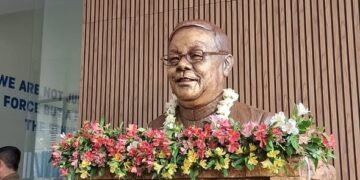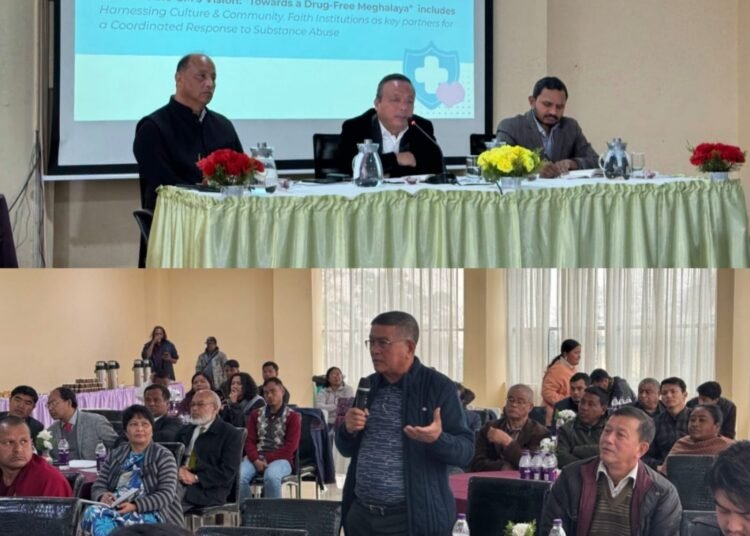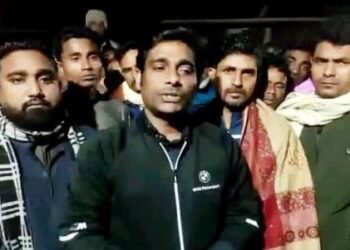In a decisive push against the rising tide of substance abuse in Meghalaya, faith leaders, and key stakeholders convened a high-impact engagement meeting with Social Welfare Minister Paul Lyngdoh today.
Faith leaders from diverse religious and cultural backgrounds voiced their commitment to fostering a drug-free Meghalaya while urging the government to provide tangible support for de-addiction and rehabilitation efforts.
As testimonies poured in – from the Shillong All Faith Forum to the Sikh and Seng Khasi communities – the need for a multi-pronged approach became clear.
An open house discussion was facilitated, encouraging faith leaders and community representatives to share their perspectives and voice their concerns and concrete suggestions.
Rev Dr EH Kharkongor of the Shillong All Faith Forum expressed solidarity with the government’s efforts, emphasising that while faith leaders may not be professionals, they are deeply committed to building a society free from substance abuse.
Wahlang from the Seventh-day Adventist Church on the other hand, underscored the importance of counseling and preventive measures.
Noor Nongrum of the Shillong Muslim Union stressed the need for sustained follow-ups on past discussions, while Jasbir Singh, representing the Sikh community, drew from Punjab’s devastating experience with drug abuse, warning that Meghalaya faces a similar crisis.
Fr. Richard Majaw of the Catholic Church suggested that the framework developed for faith institutions could be extended to schools and colleges, with government-backed funding for awareness programs and training initiatives.
Whereas, PD Nongrum, representing the Seng Khasi community, highlighted the severity of the drug crisis, calling it a major threat to families and society at large.
Nongrum stressed two key aspects—raising awareness within the community to prevent youth from falling into addiction and showing compassion to those struggling with substance abuse.
He acknowledged the role of faith institutions in prevention but asserted that law enforcement agencies must play a larger role in tackling drug-related crimes.
The discussions culminated in a response from the Minister of Social Welfare, who acknowledged the concerns raised and reaffirmed the government’s commitment to the cause.
“In December, we constituted a dedicated ANTF team with a strength of about 40 personnel whose sole focus is tackling the issue of drug abuse. All these years, the ANTF was handling multiple responsibilities apart from drug-related crimes, including law and order. But now, for the first time, we have a specialized unit, fully equipped and trained, working exclusively on drug-related cases” Lyngdoh stated.
Another key effort highlighted was the revival of Village Defence Parties (VDPs).
It was noted that Shillong had only 11 active VDPs, which was deemed insufficient for the current population.
To address this, the government had begun incentivizing these groups by increasing their monthly financial assistance from Rs. 800 to Rs. 3,000 per volunteer while also providing them with uniforms, torches, and other essential resources.
Following the Minister’s address, Sampath Kumar, Development Commissioner & Principal Secretary, emphasized the crucial role of faith institutions in this initiative, stating that the government had developed a draft framework detailing their potential contributions to the fight against drug addiction.
Kumar further noted that Rs. 50 lakh had been earmarked as an initial corpus fund to support various awareness programs led by faith institutions.
“Moving forward, we will provide financial and technical support for initiatives like communication materials, workshops, and outreach programs,” he said.
According to him, under the DREAM Initiative, the entire government, including the Home and Political Department and Social Welfare Department, are coming forward to ensure a robust response.
Francis G Kharshing, Mission Director of DREAM, urged faith leaders to combat the stigma surrounding substance abuse.
He shared a case where a family, fearing judgment, sent their child to Bangalore for rehabilitation but told others he had gone for further studies.
“Addiction is a disease, not a disgrace”, he concluded.

























